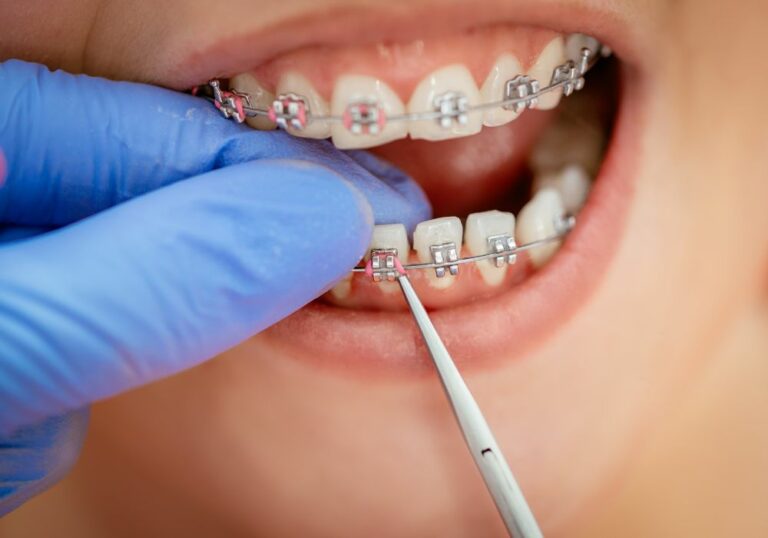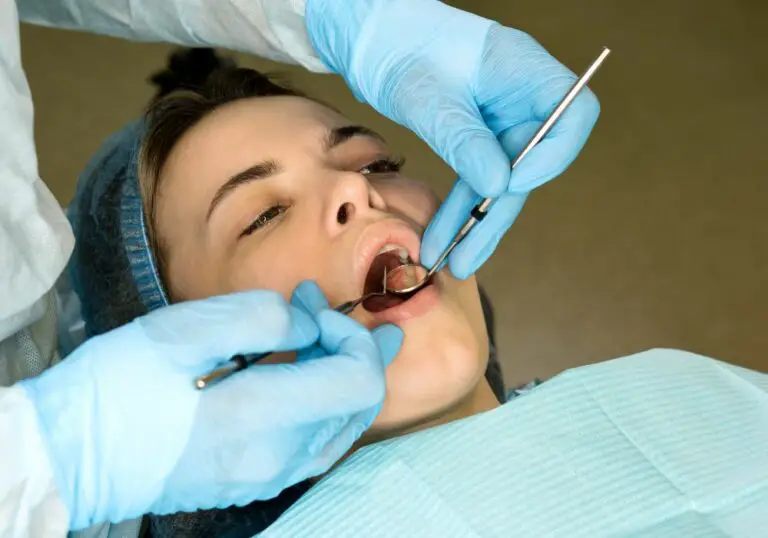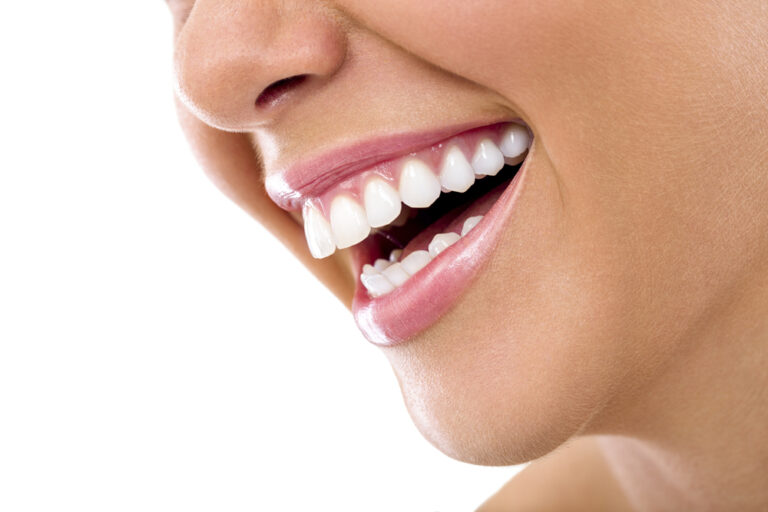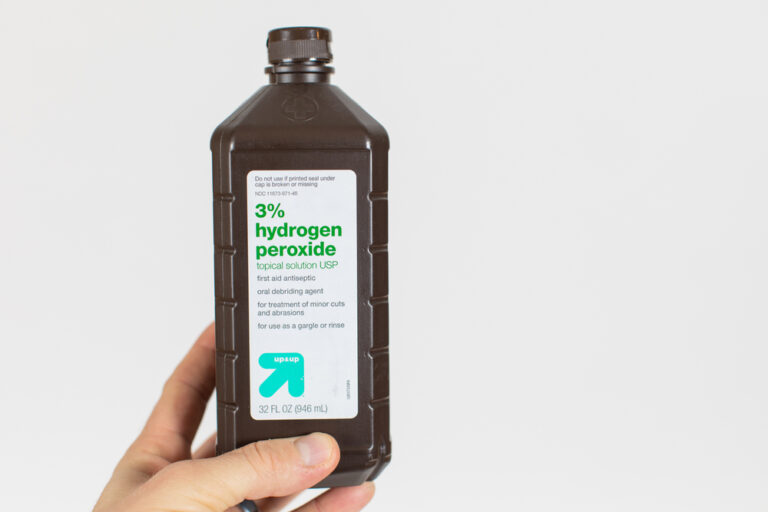Do you have gums that itch between your teeth occasionally or constantly? If you do, you are probably wondering why my gums itch between my teeth. It is not a pleasant feeling and can be a symptom of a range of dental or wider medical conditions.
In this article, we explore the causes that can make your gums itch. While this article will give you an idea of possible causes, you should visit your dentist if your gums are itching consistently to have a full check-up on your oral health and detect any issues that could become more serious if left unaddressed.
What Can Cause Itchy Gums?
There are a range of reasons why your gums might be itching. Some are more likely than others and more easily addressed. Let’s focus on the more common causes first.
An Allergic Reaction
If your itching comes on suddenly and especially if it is accompanied by other symptoms such as swelling or redness, it could be caused by an allergy. Gums are mucous membranes and react to allergens quickly.
Some food allergies can be life-threatening. If you are allergic to something like shellfish or peanuts, being exposed to them can trigger an allergic reaction that starts in your mouth. You are likely to feel itching not just on your gums, but also on the roof of your mouth, throat, tongue, cheeks, and lips.
For a minor allergic reaction, you can usually get over-the-counter antihistamine medication from the chemist. However, if you have a severe reaction, you must seek medical help immediately. Anyone with a history of allergic reactions and a high risk of an anaphylactic shock should carry an Epi-Pen and/ or wear a medical bracelet.
Buildup of Plaque
Plaque on your teeth is part live bacteria, part acidic excrement created by the bacteria. If you do not have a good dental hygiene routine and you tend to skip brushing and flossing your teeth, the plaque builds up and the bacteria begins to irritate your gum tissue.
In fact, itchy gums can be one of the earliest signs of gingivitis, a gum disease. Your gums might feel itchy when you brush and floss if you have gum disease. You are also likely to have other symptoms such as swelling and bleeding gums.
If the itching is caused by plaque buildup, you need to see a dentist for a dental cleaning. You also need to establish a proper dental routine at home, including brushing your teeth twice every day and flossing every day.
Hormonal Changes
Itchy gums can also be caused by hormonal changes. Changes in the mouth and body are more likely to affect women than men because women go through more hormonal changes during menstruation, pregnancy, and menopause.
If itching is linked to hormones, it will disappear on its own but it is still a good idea to check with a doctor or dentist. In addition to itching, the gums may also feel more tender because of hormonal changes.
Injury or Cut
If you have had an injury or cut your gum, the area around the wound may itch or tingle as it is healing. For example, you might feel itchy following wisdom tooth surgery as the surgical site starts to heal.
When itching is caused by your gum healing, the symptoms will usually disappear on their own in a few days. Your gums, like other areas covered by mucous membranes, heal fast.
You can aid the healing by keeping the area clean. If your gums are painful as well as itchy as your mouth heals, you can take painkillers or ask your dentist about a numbing mouthwash.
Grinding or Clenching Teeth
If you have a subconscious habit known as bruxism, which means grinding or clenching your teeth, it may lead to your gums itching. People who grind or clench their teeth are also likely to have worn teeth, ear or jaw pain, and scalloped areas on their tongues.
In many cases, bruxism requires retraining of your jaw muscles or wearing a protective splint while sleeping. The splint will prevent your teeth from touching. If you notice you grind or clench your teeth, each time remind yourself of the resting position for your mouth: teeth apart, lips together.
Dry Mouth
Another common cause of itchy gums is a dry mouth or xerostomia. This happens when there is not enough saliva to keep your mouth lubricated. Because there is no saliva, your gums can become more easily irritated. You might experience a burning sensation as well if the itching is caused by a dry mouth. Other signs can include dry lips and tongue and bad breath.
To treat a dry mouth increase the amount of water you drink during the day. You might also try moisturizing drops for your mouth or using toothpaste designed to treat the condition. You should also speak to your physician or doctor to investigate the causes of your dry mouth.
Less Common Itchy Gum Causes
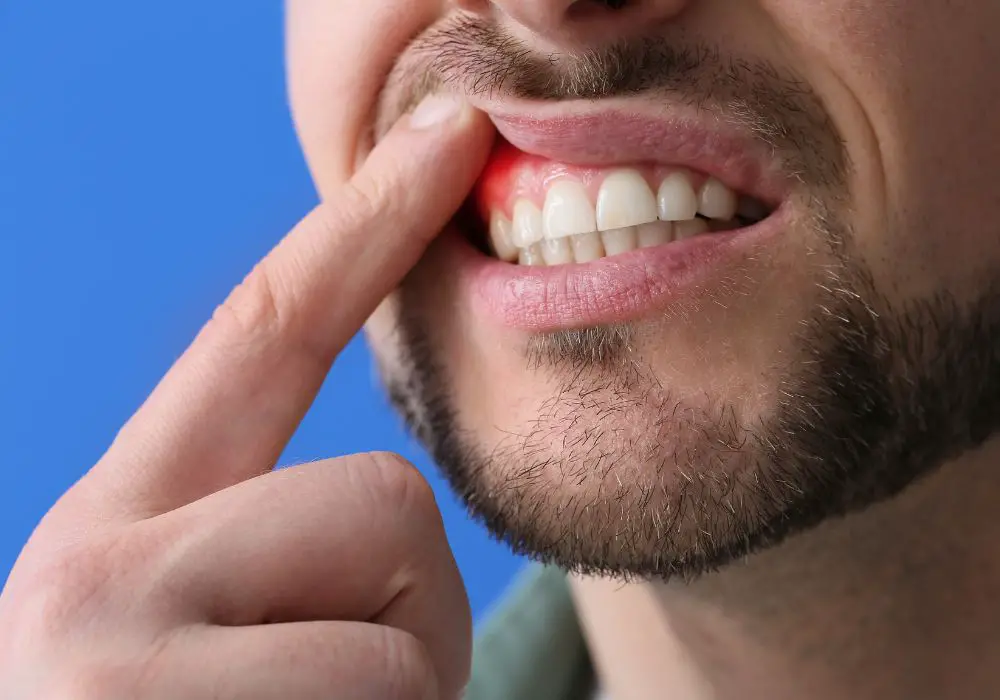
Your itchy gums may also be linked to one of the causes listed below. However, these causes are less likely than the ones included above.
Wisdom Teeth
When children are teething, they get sore and itchy gums. The same will happen to adults if their wisdom teeth are growing. You can soothe the gums and reduce the inflammation by rinsing your mouth with warm salt water. You should also see a dentist as some people may not have the space for wisdom teeth in their mouths.
Tooth Abscess
If you have an abscess in a tooth, you are likely to have a small fistula that looks like a pimple on the gums. You may also have a salty taste in your mouth. Having root canal treatment is required to treat an abscessed tooth.
Canker Sores
Canker sores are aphthous ulcers that are round, small raw sores in your mouth. Occasionally these sores can cause itchiness. While the sensations caused by ulcers are not pleasant, they will disappear on their own.
Sometimes it may take up to fourteen days for a sore to disappear but often they go faster. You can help the healing process by keeping the area clean and not irritating it when brushing or eating.
At-Home Teeth Whitening
If you have whitened your teeth at home, you may find your gums itching following the whitening treatment. The itching can be caused by exposure to hydrogen peroxide in the whitening product. It is highly advisable to speak to a dentist before using teeth whitening kits at home. The itching will most likely disappear in due course on its own.
Viral Infections
If you are about to have an outbreak of cold sores or another type of viral infection, you may have an itchy sensation in your gums before the sore appears. You can get over-the-counter medicines to treat viral infections. Your dentist may also provide laser treatment on the infected area.
Other Symptoms That May Indicate Oral or Medical Issues
Sometimes you may get itching on your gums without any other symptoms. Other times, itching will be accompanied by other symptoms, including redness, rashes, visible irritation, swelling, bleeding, tingling, or tenderness.
It is also possible that you have some symptoms outside your mouth simultaneously with the itching. These symptoms may include fatigue, breathing difficulties, nausea, headaches, or itching in other parts of the body. When this happens, you should seek medical attention as it could be a sign of a serious medical condition.
How to Prevent Itchy Mouth
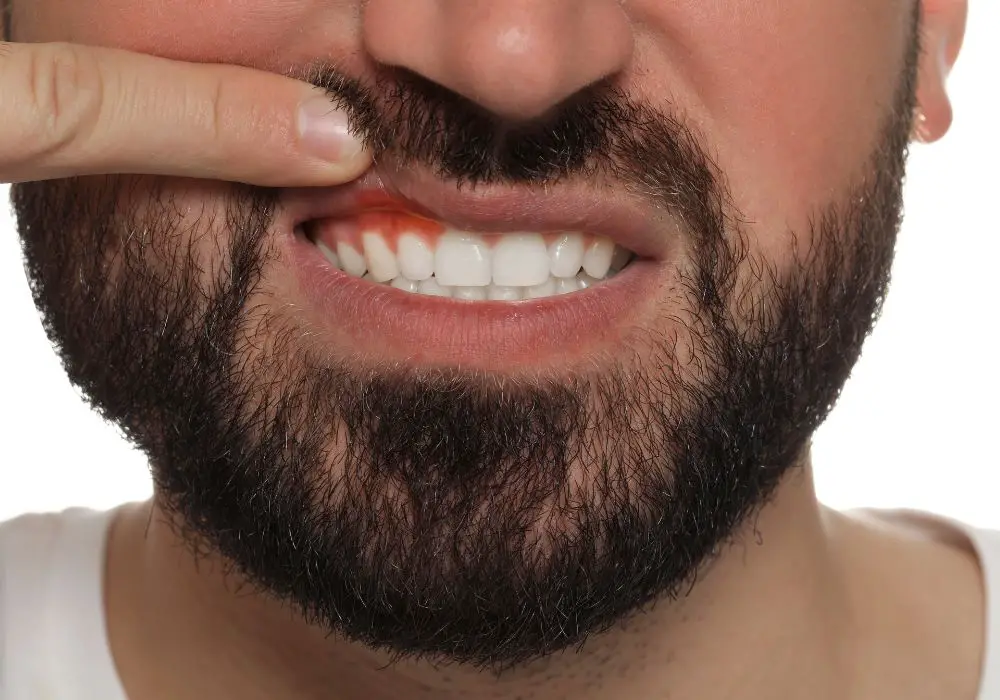
While itchy gums may sometimes be unpreventable, there are things you can do to minimize the risk of itching gums. You can keep your mouth, teeth, and gums clean by practicing proper dental hygiene which includes brushing and flossing daily. You should also have regular dental checkups to support your at-home dental routine.
Avoid eating anything that may trigger an oral allergy syndrome. If you have a known allergy, read food labels carefully, and when eating out check what ingredients have been used to cook the meal. This is especially important with, for example, nut allergy, where the tiniest traces can cause a severe allergic reaction.
Eating a balanced diet with plenty of raw fruit and vegetables, foods rich in minerals and vitamins will also support good oral health. Not smoking and avoiding foods and drinks that are high in sugar or very acidic can also help prevent issues with your gums.
Conclusion
Some causes of itchy gums are nothing to worry about and the itchiness will go away on its own in due course. However, sometimes there may be more serious reasons behind the itching. If the itching is sudden and accompanied by other symptoms, you should seek medical attention immediately as it could be an allergic reaction.
If your gums itch between your teeth and the itching does not disappear in a few days, you should consult your dentist or physician to examine the cause of your oral symptoms. Practicing good oral hygiene at home and seeing your dentist and dental hygienist regularly for checkups and cleaning can help prevent itching gums.

